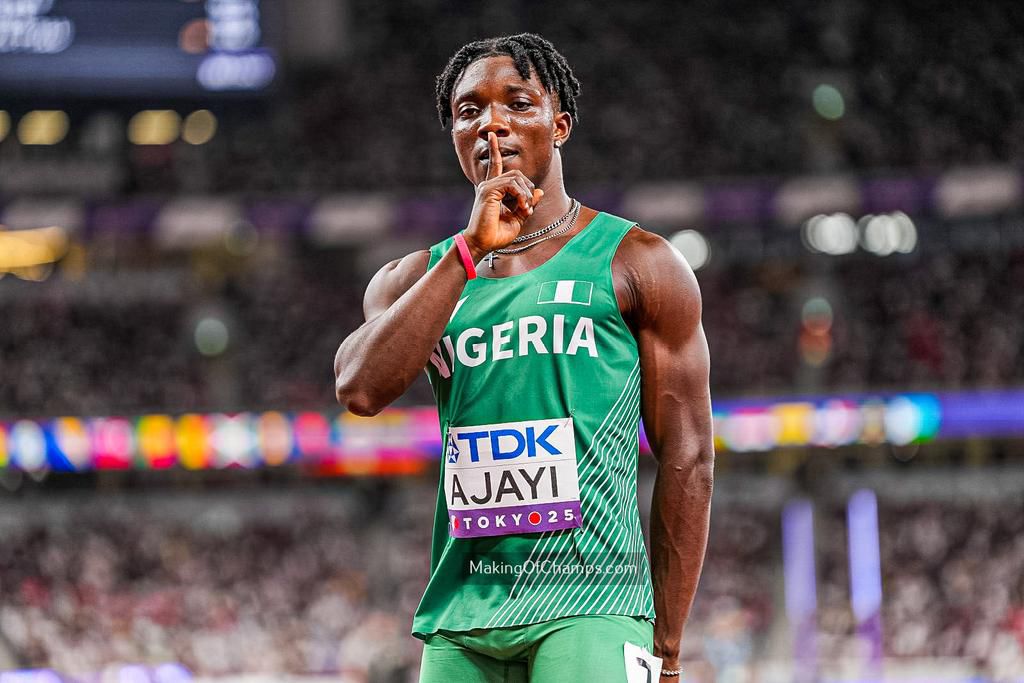For years, Nigerian athletics has lived in the shadow of its golden era, when sprinters like Daniel Effiong and Olusoji Fasuba carried the hopes of a nation on their fast-moving legs. That era, full of sub-10 second 100 metre times and fierce global competitiveness, has gradually slipped away, hampered by bureaucratic neglect, funding scandals, bad administration from the Athletics Federation of Nigeria (AFN) and inconsistent support from the government. Many feared Nigeria’s sprinting legacy had become a relic.
Then came Kanyinsola Ajayi.
Ajayi, a 20-year-old sprinter based in the United States, has shattered expectations by qualifying for the 2025 World Athletics Championships in Tokyo with a 9.96 seconds finish in the 100m at Gainesville, Florida. He is now among the fastest in the world this season. Not only that, he is the first Nigerian male to qualify in the blue riband 100m event for the 2025 Championships and one of very few to break 10 seconds recently. This break is symbolic. For nearly two decades Nigeria’s male sprinting presence at world events has been erratic. While there have been talented individuals, the consistency needed to reach global finals or make headlines had waned. Ajayi’s rise marks a break in that decline.
Behind Ajayi’s emergence lies a complex web of issues. The AFN has in recent years been accused of mismanaging funds, failing to ensure timely visa applications for its athletes, neglecting proper facilities, and at times selecting relay teams in erratic fashion. In 2025 Nigeria withdrew from the World Relays in China because of “unacceptable visa delays” a decision that cost many athletes their chance to compete at global level. That episode revived older grievances about how logistical incompetence from the federation and its partner, the National Sports Commission (NSC), undermine the dreams of young talents. Fans and analysts asked sharply why Nigerian athletes often have more officials than properly registered athletes at championships and how much of the excuse is beyond incompetence. Many suggested that those running athletics in Nigeria treat global representation like a media show rather than a duty to athletes.
In that landscape of disappointment, Ajayi’s performance has cascade effect. He not only equalled a national 60m indoor record of 6.48 seconds, set by Deji Aliu in 1999, but reached the sub-10 second mark in the 100m just a month later. Whereas Aliu took several years to break ten seconds after his 60m performance, Ajayi did it rapidly. He also won the national 100m title in 2024 at the Nigeria Olympic trials in Benin among a highly contested field, making himself impossible to ignore. On top of that he has set new meet records abroad such as at the Meeting International de Sotteville-lès-Rouen in France where he blazed to 9.92 seconds. His run placed him among Nigeria’s top sprinters ever, breaking meet records and edging close to national records that have stood for decades.
Controversies persist though, especially around athlete welfare. While Ajayi and others like Favour Ofili and Tima Godbless earned qualification for Tokyo’s world championship, many more were left on the shelf for reasons that often had nothing to do with their performance. Relay teams that should have automatically entered were not fielded because of loose ends in registration, visa problems or federation inertia. Coaches complained about lack of incentives, delayed payments and inability to access decent training infrastructure at home. Critics accuse the AFN of focusing on rhetoric and appearance while neglecting basics like timely medical support, consistent team management and honest selection processes.
Still, Ajayi’s story offers hope. It reminds Nigerians that even in the midst of systemic issues the raw talent is still there. It also focuses attention again on the cost of neglect. If federations and government bodies do not change their ways—if visas are delayed, if administrative chaos continues, if athletes are not given stability—more stories like Ajayi’s may be rare rather than inspirational.
Ajayi now heads to Tokyo carrying more than just the hopes of sprint fans. He is chasing times and perhaps medals but also accountability. He is proof that despite institutional failures he can rise, break records, rewrite narratives and inspire. His dash to world stage forces a reckoning: can the AFN and related bodies step up so that the next generation does not have to run over broken ground? Nigeria’s triumph in this moment is Ajayi.
Nigeria’s challenge is making sure it is not the exception.
Samuel Aina

